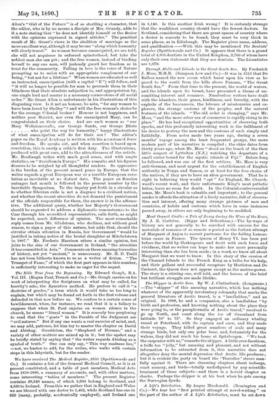Through Atolls and Islands in the Great South Sea. By
Frederick J. Moss, M.H.R. (Sampson Low and Co.)—It was in 1513 that De Balboa named the new ocean which burst upon his view as he gazed to the south from the hills above Panama, "The Great South Sea." From that time to the present, the world of waters, and the islands upon its breast, have presented a theme of an- remitting interest and romance. Numberless writers have dealt with the islanders, their grace, kindliness, and ferocity, with the exploits of the buccaneers, the labours of missionaries and ex- plorers, the strange customs of the peoples, and the natural features of the islands. "The old order is changing," says Mr. Moss, "and the more sober era of commerce is rapidly rising in its place." He has had exceptional opportunities of observing both epochs, and this profoundly interesting work is the fulfilment of his desire to portray the men and the customs of each simply and faithfully. From notes made two years ago, during a seven months' voyage among the least frequented groups, the more modern part of his narrative is compiled ; the older dates from thirty years ago, when Mr. Moss "stood on the beach of the then little seaport of Lyttelton (N.Z.) watching the departure of a small cutter bound for the mystic islands of Fiji." Before long he followed, and was one of the first settlers. Mr. Moss is very anti-German, and most urgent for the establishment of English authority in Tonga and Samoa, or at least for the free choice of the natives, if they are to have an alien government. That he is right in believing they would " opt " for England, Mr. Church- ward's recent work, and their unfortunate King's most pathetic letter, leave no room for doubt. In the Colonial-controversalist sense, Mr. Moss's book is valuable and important ; to the general reader it affords the attraction of a lively narrative, full of observa- tion and interest, offering many strange pictures of men and countries, of habits and customs which have in some instances passed away, in others are only beginning to be modified.


































 Previous page
Previous page